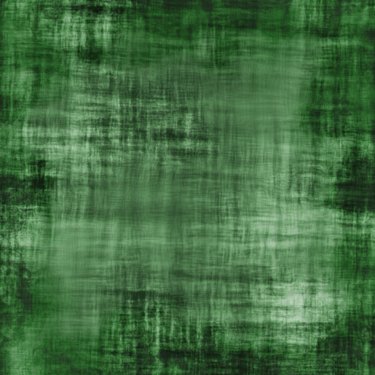
There are many different kinds of fabric paint and even more ways to use them. As well as traditional fabric paints that you apply with a brush, you can find paints designed to be squeezed onto fabric and fabric spray paints. You can use a brush to create your designs or apply paint with sponges, stamps and rollers. Resist techniques, such as batik and techniques using sunlight or heat, offer even more options.
Transparent Fabric Paints
Video of the Day
Most fabric paints are transparent. Transparent paints offer more subtle effects than opaque paints when used on light colors; however, you cannot use them on dark colors like navy or black. Thin fabric paints will tend to bleed into the fabric around them; this makes them a good choice for washes. You can find thicker paints which are better for stamping, printing and stenciling.
Video of the Day
Opaque Fabric Paints
White paints and paints with pearl and metallic effects are usually opaque. You can also find opaque paint in standard colors. They cover up the color beneath and thus will show up on dark colors. You can achieve attractive effects by painting with dark colors and applying metallic or pearl colors over the top. You must mix pearl and metallic colors very thoroughly as the tiny flecks that produce the shimmering effect tend to separate out. Opaque fabric paints are a good choice for stamping and printing.
Dyes
Dyes are different from fabric paints. They are harder to use, but have some advantages. Paints stick to the surface of the fabric or soak in to coat the fibers, sticking like glue; dyes bond chemically with the fabric. This bond is much stronger than the adhesive bonds formed by paints, meaning that dyes can last longer than paints and can tolerate rougher handling. They also change the "hand" (texture) of your fabric less than paints, which tend to make fabrics stiffer. You can use dyes to paint washes on your fabric and in resist work.
Spray Fabric Paint
Spray fabric paint is specially formulated paint sold in an aerosol spray. You can use it to paint large areas of fabric evenly. It is good for some kinds of resist painting and for stencils.
Painting With a Brush
You can paint on fabric in a similar way to painting on paper. Fabrics with smooth surfaces are easier to paint than rougher fabrics. Stretching your fabric tightly will make it easier to paint on. It is helpful to sketch your design before you begin; you can sketch directly onto the fabric with chalk or special markers that wash out. Dip your brush into your desired color and paint directly onto the fabric.
Sponges and Stamps
Sponges let you paint fabric in large, broad strokes. You can find sponge brushes that have wedge-shaped heads, giving you more control. Natural sponges make interesting patterns when used with fabric paint. You can make stamps from thick high-density foam rubber. Another traditional way to apply fabric paint is to use a stamp carved from half a raw potato; this is called potato printing. It is a good choice for simple designs and a fun technique for children.
Stencils
Stencils allow you to apply paint to specific areas of fabric while masking the parts you do not want to paint. You can find ready-made stencils or make your own. Use a stiff brush with short bristles or spray fabric paint to create stencilled designs.
Batik and Sun Painting
In batik, you apply a design to the fabric in wax or a special fabric resist medium. When you paint the fabric, the areas around the design absorb the paint but the wax repels it, leaving a pattern. In sun painting, you place objects called masks on a freshly-painted or dyed piece of fabric; the fabric under the masks remains paler than the surrounding fabric. You can also find photo-sensitive dyes that react to sunlight, allowing you to "photograph" the outlines of your masks.